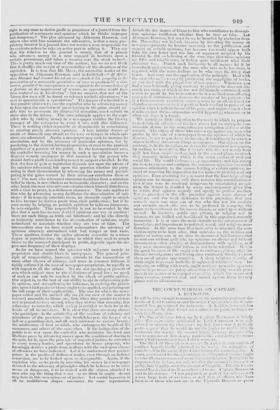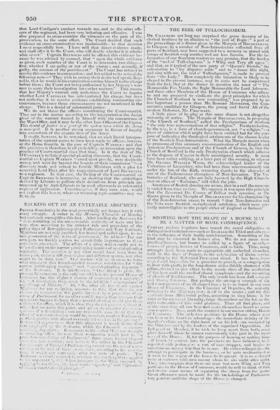'I'll correct) amenable to blame, are, first, when they pander
to vicious IT Will it ti1110 ellOngll to conwnent en the respective merits or de-
and depraved tastes ; second, lo ii tlwy violate that sincerity, that DlOritS cii 1,C1ril CAn 1,10.01 1111d his senior Capain 'ales) the Court- telherenee to veracity, which soviety is entitled to look tot at the martial has pronounced its judgment. A deeision, how et es, has
of
w.lat tat, .eatount ot: ee:11. 1 ie l,`.111.• that Lord Cardigan's conduct towards me, and to the other offi- cers of the regiment, had been very irritating and offensive. I was also prepared to cross-examine the witnesses on the part of the prosecution, to the same effect. The Court decided that such evidence on cross-examination was inadmissible : to that decision I most respectfully bow. I have still that direct evidence ready, and shall ofr.Nr it to the Court, who will decide whether it is admis- sible or not." Captain Rim:imam said he oflisred this evidence be- cause he was advised by counsel, that " upon the whole evidence as given, each member of the Court is to determine two things— first, whether I am guilty or not of the charge; and secondly, if guilty, the amount of the punishment." The Court has refused to receive this evidence in extenuation ; and has added to its refusal the following note—" They wish to convey their desire to Captain Rey- nolds, that he would in his examination confine himself to the charge before them; the Court not being authorized by. her Majesty's war- rant to carry their investigation into other matters." This means, that her Majesty's warrant only authorizes the Court to inquire whether Lord Canznoss has substantiated his charge, but does not authorize it to receive evidence establishing extenuating cir- cumstances, because those circumstances are not mentioned in the charge. This is a denial of substantial justice. We do not blame the officers constituting the Court-martial. They act in the matter according to the interpretation the Judge gives of the warrant framed by himself with the concurrence of the War-Office, and it may be the other Law Officers of the Crown. This denial if justice is a part of tlw system aptm which the _Irmy is managed. It is another strong argument in favour of inquiry into and retbrm of the organization of the Army.
It ought, however, to be remarked, that no such literal interpre- tation of the warrant seems to have been made by officers, lawyers, or the Horse Guards, in the case of Captain WATHEN ; and that this precision is therefore, in all probability, an innovation upon the practice of Courts-martial since that time. Is it the fruit of Mr. O'CONNELL'S technical special-pleading discovery, that the Court- martial on Captain WATHEN " erred most grossly, were decidedly wrong, and went fitr beyond the bounds of their commission" ?—a discovery made and vented to furnish Ministers with a plea for screening Lord Mar, after his reappointment of Lord Bnunnxi-J.r. to a regiment. In that case, the finding of the Court-martial on Captain REYNOLDS is instructive, as showing that the subterfuges devised by Liberals to palliate their deviations from principle are treasured up by Anti-Liberals to be used afterwards as substantial engines of oppression. Constituencies, if they were wise, would not neglect this lesson, whatever trimming representatives may sec fit to do.



























 Previous page
Previous page